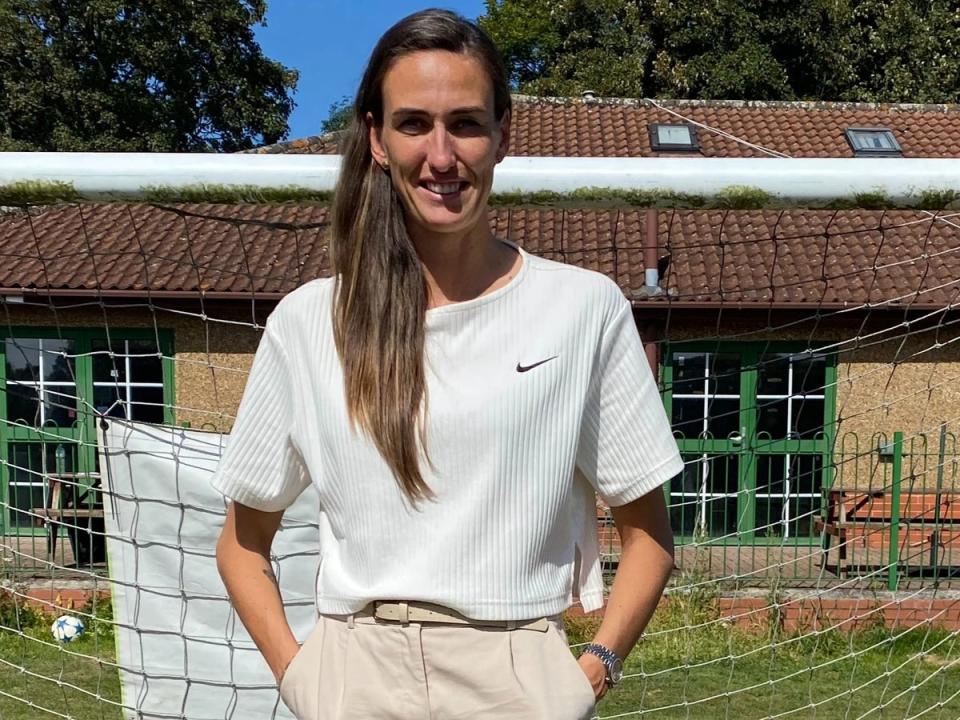Jill Scott says World Cup kiss saga ‘overshadowed’ Spanish women’s team playing ‘great football’
Euro 2022 winner Jill Scott has voiced “disappointment” that the World Cup kiss saga has detracted attention from the Spanish women’s team win.
The former England midfielder told The Independent that issues within Spanish football have “overshadowed” the team’s “great football”.
Her comments come after the president of the Royal Spanish Football Federation Luis Rubiales has come under sustained criticism for kissing player Jenni Hermoso on the lips after Spain secured their 1-0 win over England last month.
Rubiales, who was also condemned for grabbing his crotch after Spain won the women’s world title for the first time in history, has refused to step down over his behaviour but was suspended by Fifa.
It comes as Jorge Vilda, head coach of Spain's women's team, was fired on Tuesday after he was among those who praised Rubiales’ refusal to step down.
Scott said she felt “disappointment” that the kiss has been “the main talking point” rather than Spain actually winning the World Cup.
“I know that there were girls that decided not to go to the World Cup because they weren’t happy with the way things were going. And that for me is just so sad to hear because it’s a dream to play in a World Cup.
“I was so fortunate that I got to do that four times, and it’s something that you dream of from being a young girl, and to think that was taken away from them. First and foremost, that is sad.”
Speaking to The Independent in a wide-ranging interview, the Lioness also discussed the bullying she endured as a young girl playing football at school. She said people often thought she was a boy because she played football and questioned how girls could play the game.
The 36-year-old said it was “unusual” to see girls playing football back then and said she sometimes suffered worse bullying from parents rather than her classmates.

“Sometimes for parents, if a young girl back then – I’m going back 30 years – beat their son, it was a bit of an embarrassment,” she added.
Scott said would attend football camps where she was the one girl alongside 50 boys, as well as going to football tournaments where she was the only girl.
The former footballer said even though she was better at football than some of the boys she “never wanted special treatment for being a girl”.
Scott added: “I just wanted to play football and as a young kid, I didn't understand why it was such an issue that I just wanted to play football”.
She continued: “Once I stepped over that white line, that was where I wanted to be. I could escape everything.”
Her comments come as new research by Starling Bank found three in 10 girls stop playing football when they get to their late teenage years – a far higher proportion than the one in ten boys who give up the sport.
Researchers, who polled 2,000 11 to 16-year-olds in the UK, found over a quarter of girls quit football over pressures to perform well at school. Meanwhile, 14 per cent stop playing because of insecurities about their body image and eight per cent bow out of football for being bullied for playing the game.
Scott, who is an ambassador for the bank, said social media pressure was partly to blame as it puts pressure on girls to make them feel like they should look a particular way.
“It's kind of this perfect world isn't it, in a sense,” she reflected. “And I think we're all guilty of doing it. We don't want to post a picture unless you look good or if it's filtered.”
Scott explained she has coached football to girls aged between 13 and 15 and you can see they do not want to get “stuck into a tackle” or do not “want to get sweaty” due to anxiety about how they will look.


